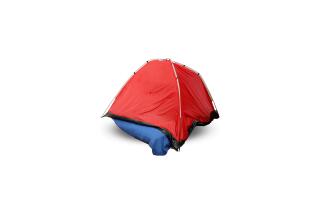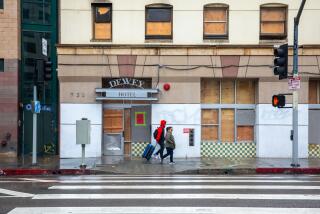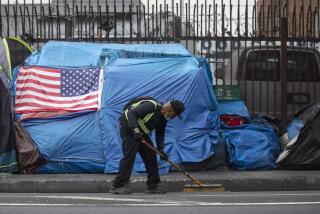Glendale’s homeless community lost access to showers during the pandemic. A nonprofit sees racism
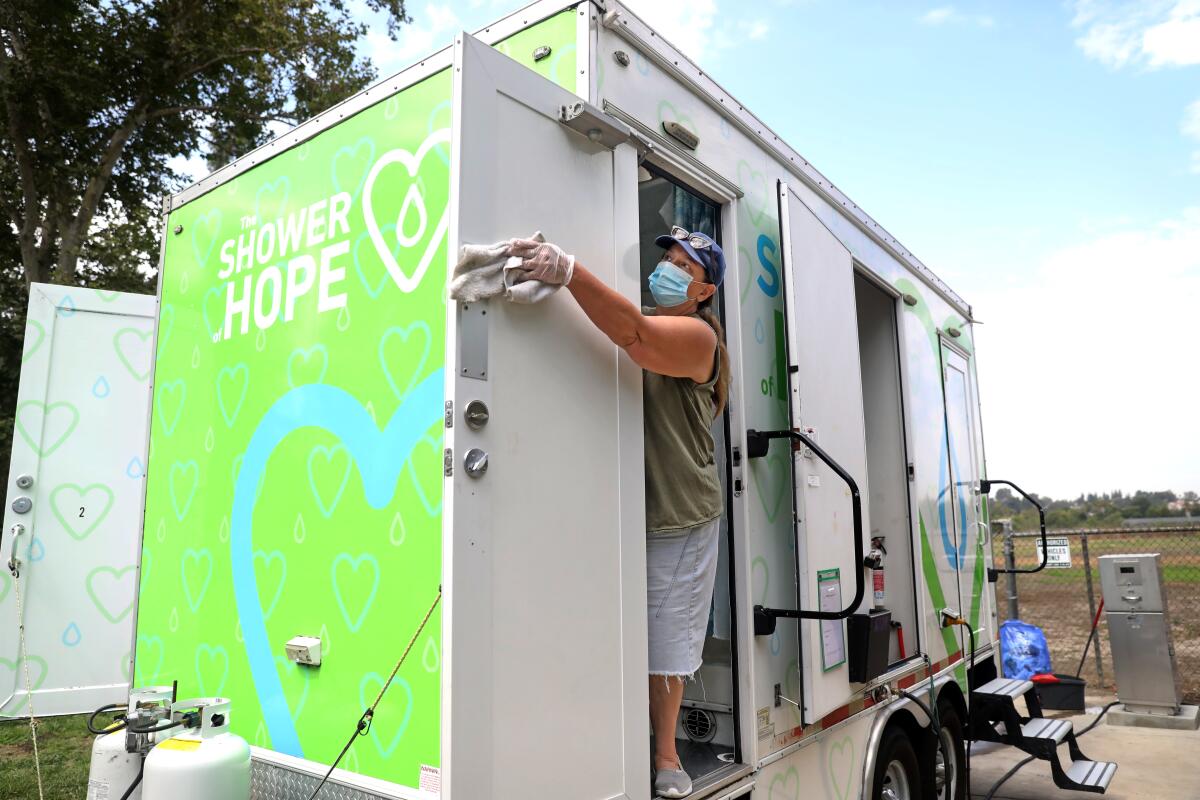
At the outset, in May 2020, there appeared to be little that could cause controversy around a program offering showers to homeless people in Glendale.
There was clearly a need, especially in the midst of a pandemic. Homeless shelters were shedding capacity to avoid overcrowding. Public health officials urged frequent hand washing and cleanliness. The program was operated by a nonprofit, Shower of Hope, that had successfully operated similar services throughout Southern California for several years. And cities had access to new federal funding, under the COVID-relief CARES Act, allowing them to expand services.
Five months later, Shower of Hope had shut down its Glendale operation after being hounded by the city of Glendale for information it said it could not provide. Looking back now, a top city official says it was all a mistake. But some critics see the specter of racism in the bureaucratic standoff.
At the core of the dispute was the city’s insistence that federal regulations required the program to verify that anyone asking to take a shower was actually homeless. Shower of Hope officials said that rule was almost impossible to fulfill and ran counter to the organization’s philosophy of helping anyone who needed it.
But there was no such requirement.
“There was a misunderstanding on the city’s part,” said Onnig Bulanikian, Glendale’s director of community services and parks.
By the time the city acknowledged the mistake, the program was long gone. Rather than risk turning people away, Shower of Hope ceased operations in Glendale as relations between the two camps became increasingly strained. Roughly 20 to 30 people a week had used the service, accepting warm showers and hygiene basics such as shampoo and towels when they were offered Mondays in the parking lot of the Glendale Central Library.
After the program ended, library staff members have reached out repeatedly to the city to “communicate that there is a need in our community,” said Arsine Isayan, Glendale’s interim community services manager overseeing homeless services. She said homeless individuals are instead using the restrooms inside the library.
“Looking back, we would have definitely done [things] differently,” Bulanikian said, adding later, “Is there a regret? Yes.”
::
On a sweltering July day at a site on the edge of Lincoln Park on Los Angeles’ Eastside, Laurence Gasparro, 57, emerged dressed after a shower feeling “a lot better.” Gasparro lives in his car and began using the showers around January 2020. When his mother, whom Gasparro took care of, died the previous October, he said, “we lost everything.”
Gasparro has lupus, an autoimmune disease that caused sores to break out on his nose and ears. He said the showers let him keep the sores clean. Without them, “I don’t know what I’d do,” he said.
Shower of Hope allows anyone to use its services — shower stalls built into a truck — unless they pose a safety risk. The vast majority of the clientele is homeless, but no one is required to divulge their name or where they slept last night, said co-founder and Executive Director Mel Tillekeratne.
“I’m not going to discriminate against people,” Tillekeratne said. “We’re not offering apartments, we’re not even offering motel vouchers for one day. It’s a shower.”
Shower of Hope began operating around 2017, growing out of Monday Night Mission, a grass-roots organization led by Tillekeratne that served food on skid row. After attracting a large number of volunteers and donors, Tillekeratne said, he and another volunteer decided to leverage the energy to create the mobile shower program. “Shower” is singular in the name because “it was going to be one,” Tillekeratne said, but it has since expanded to more than 20 sites across Southern California, including Long Beach, Pasadena, Riverside, Bakersfield and several within the city of Los Angeles, including Lincoln Heights.
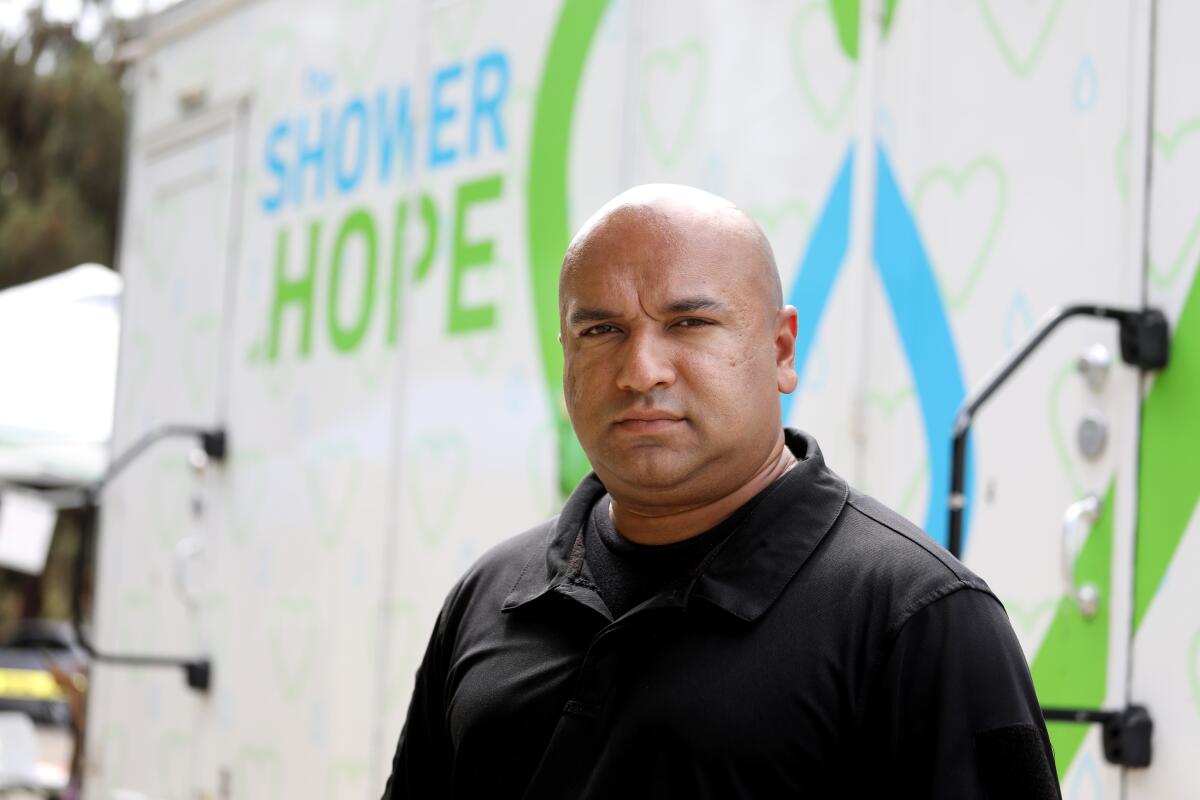
::
Funds for Shower of Hope’s short-lived Glendale site came from the CARES Act, with an aim to “prevent, prepare for and respond to” the COVID-19 crisis among the homeless and those at risk of homelessness.
Ivet Samvelyan, Glendale’s former community services manager, then overseeing the project, said in May the CARES Act funding required the city to verify that those using the showers were homeless and collect other demographic information.
That wasn’t accurate. Officials with the federal department of Housing and Urban Development said the type of service and location where it was offered — a semi-public shower in a parking lot — were sufficient to presume the population being served was homeless or in severe need. No individual documentation was needed.
Brenda Wiewel, former director of the USC Initiative to End Homelessness, said that those types of programs don’t have the staff to collect much data — and that extensive requirements deter those in need. “If you’re on the street and you’re frightened and depressed and really scared — and you’re feeling really dirty — and there’s a place nearby where you can just go and take a shower and feel a little better, you’re not going to necessarily want to do that if it’s all official,” she said. “It will turn people away.”
Samvelyan left Glendale in June to take a position with the Los Angeles Homeless Services Authority, where she now serves as director of permanent housing. In a statement emailed through a spokesperson, she declined to comment except to say she hadn’t followed developments with the project after her departure.
Relative to many cities within the county, Glendale has a small homeless population. During the 2020 homeless count, there were 169 people who met the criteria for homelessness, down from 243 the year prior, according to a city report. Los Angeles counted 41,290 in 2020, an increase of nearly 5,000 people from 2019.
::
On Oct. 12, 2020, the last day the site would operate, Diane Garcia, then a housing inspector for the city, emailed Samvelyan to say she had dropped by the site near the Glendale Central Library and had two encounters she “wanted to bring up.”
One was with a woman from Burbank, the other with a man from Glendale. Both lived in apartments, but, for various reasons, still needed to use a public shower.
Less than 30 minutes later, Samvelyan emailed Tillekeratne to complain. “This is not the 1st time that staff or I have talked to people at the program who are not homeless, at risk and not from Glendale,” she wrote.
Two days later, Tillekeratne denied that people who were not homeless were using the showers. Still, he wrote, they would not turn anyone in need away: “As a nonprofit that serves those who need showers, turning away people who have no other option is not an option for us.”
Garcia was let go by the city in February of this year for reasons the city did not disclose.
Isayan, who has temporarily assumed Samvelyan’s role, noted the shower program launched in the confusing, whirlwind moment that was the onset of the pandemic. Services were rolled out at a breakneck pace amid uncharted circumstances. Normal protocols went out the window.
“We had to quickly mobilize, we had to provide the services,” Isayan said.
Guidance from the federal government for key issues, including documentation requirements, did not arrive until September, or roughly four months after Glendale started offering the showers.
But it would be nearly a year later, in August, before Glendale officials reached out to HUD to clarify what documentation was needed. At that point, the program had been closed for nearly a year.
Glendale officials said they have asked Shower of Hope if it would be interested in working in the city again, but have not heard back.
::
What Bulanikian, Samvelyan and other city employees painted as a technical glitch, Shower of Hope’s Tillekeratne sees as an echo of the city’s troubling history of racial exclusion as a sundown town — for which the City Council apologized in September 2020, one month before the shower program was canceled. Sundown towns, which date to the late 19th century, kept out Black people, and sometimes other minorities, through a combination of laws and informal policies.
“If you’re really open to Black and brown people using your city, then open it up to people suffering from poverty,” Tillekeratne said.
Glendale city officials, including Bulanikian and Samvelyan, rejected the racism allegation.
Once a bastion of white supremacy, Glendale is now the first city in California to pass a resolution apologizing for its history of racial exclusion.
Glendale City Councilman Dan Brotman, who was not directly involved in overseeing the shower program, called the nonprofit’s accusations farfetched. To attribute racist intent to the city’s actions, he said, “is absurd.”
Brotman last year worked with a local advocacy group, the Coalition for an Anti-Racist Glendale, to help develop the sundown town resolution. At the time, the city was heralded for its bold move: It was the first city in California, and just the third in the nation, to pass such a resolution.
Tara Peterson, who helps lead the Coalition for an Anti-Racist Glendale, said in late June that the city had done a great job raising awareness in the wake of its resolution but hasn’t delivered on structural and institutional change.
When briefed about the situation with Shower of Hope, Peterson said she was not surprised.
Peterson, also chief executive of YWCA Glendale and Pasadena, said she has faced similar pressure from Glendale officials to help only women living within the city in its domestic violence programs. She said she refused to turn away domestic violence victims just because they came from other parts of the county.
“And the reality,” she said, “is that it’s another way of trying to keep Glendale the same, right?”
More to Read
Start your day right
Sign up for Essential California for news, features and recommendations from the L.A. Times and beyond in your inbox six days a week.
You may occasionally receive promotional content from the Los Angeles Times.

